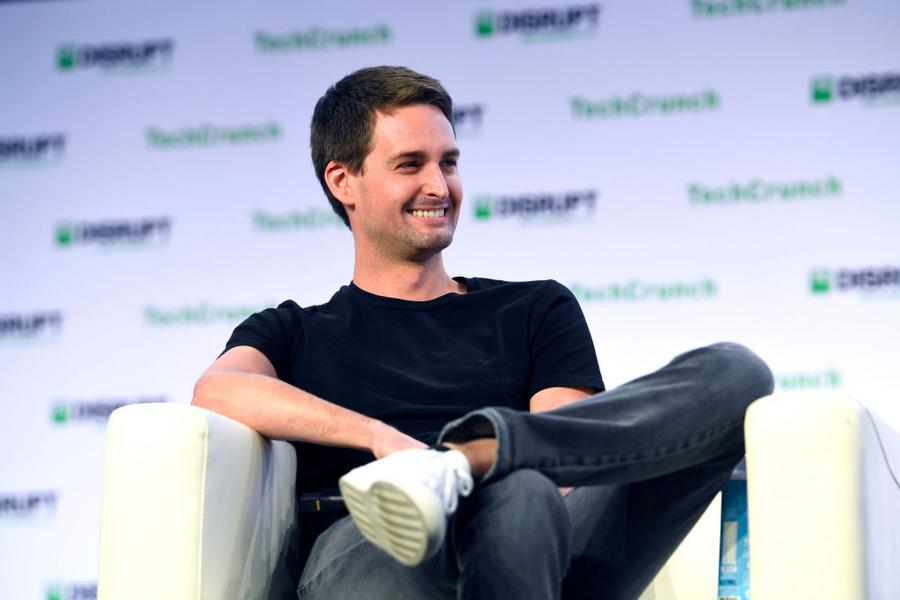What is Evan Spiegel's Net Worth?
Evan Spiegel is an American entrepreneur who has a net worth of $2.6 billion. Evan Spiegel has earned his fortune as the co-founder of Snapchat, technically now known as Snap Inc. At the peak of Snap's stock price, Evan has been worth as much as $15 billion. In the ten months between mid-September 2021 and late July 2022, Evan's net worth plunged from $15 billion to around $2 billion as the share price of Snap fell from $83 to around $10.
Early Life
Evan Thomas Spiegel was born in Los Angeles, California, on June 4, 1990. His parents, John W. Spiegel and Melissa Ann Thomas, are both lawyers. He was raised in Pacific Palisades, California, in an Episcopalian household. He attended high school at the Crossroads School for Arts and Sciences in Santa Monica. While still a high school student, he took design classes at the Otis College of Art and Design, as well as the Art Center College of Design in Pasadena. He continued his education at Stanford University.
Snapchat
While a student at Stanford, where he studied product design, Spiegel proposed an idea for an app with ephemeral messaging for a class project. His classmates did not think it was a good idea, but he did not give up. Instead, he teamed up with fellow Stanford students Bobby Murphy and Reggie Brown to develop the idea. They launched the prototype under the name "Picaboo."
At some point in 2011, Reggie Brown left the company. He would later sue Evan and Bobby, claiming that Snapchat was his own idea. Reggie Brown ultimately received a $158 million settlement.
They eventually renamed it "Snapchat," and by 2012, the app was gaining in popularity with over 1 million daily active users. As a result, Spiegel actually left Stanford shortly before graduating to focus on the app full-time.
The application allows you to photograph something, add text or sketch on the image, and then send it to a controlled group of recipients. You can then specify how long the person can view the image, from 1 to 10 seconds. After that, the image is deleted from their smartphone and the Snapchat server.
At some point in 2013, the founders rejected an all-cash acquisition offer from Facebook for $3 billion. That turned out to be a very wise decision because, in August 2014, Snapchat took on an investment from Venture Capital firm Kleiner Perkins that valued the company at $10 billion.

Getty
IPO
On March 2, 2017, Snap Inc. debuted on the New York Stock Exchange. The company was expected to go public at $17 per share but actually opened up at $24, ending the day with a market cap of $20 billion.
On the day of the IPO, Spiegel sold 16 million shares, resulting in a $272 million pre-tax windfall (roughly $180 million after taxes). At the time Snap began trading, Spiegel became one of the youngest public company CEOs. He was 26 years old at the time.
For successfully guiding the company to an IPO, Evan was also awarded 37 million additional company shares, which at the time of the award were worth around $850 million.
At the time of Snap's IPO in March 2017, Evan Spiegel was 28 years old. Going into the IPO, he was already a billionaire on paper based on Snap's private valuation, but the public offering cemented his billionaire status. At the close of the IPO day, Evan's net worth was $4 billion. That made him one of the youngest official billionaires on the planet.
Wealth Fluctuations
As of this writing, Spiegel still owns 210,970,819 shares of Snapchat.
In June 2020, his net worth was $4.5 billion. By December 2020 his net worth had climbed up to $9 billion. By September 2021, his net worth had climbed to $13 billion.
Between January 1, 2022, and November 2022, Snapchat's stock price fell roughly 80%.
In October 2022, when the stock price sank to $7.50, Evan's shares were worth $1.57 billion.

(Photo by Steve Jennings/Getty Images)
Personal Life
Spiegel began dating Miranda Kerr, an Australian model, in 2015. They got engaged in July 2016 and married in May 2017. Together, they have two sons, Hart Kerr Spiegel (born in 2018) and Myles Spiegel (born in 2019).
He revealed in 2018 that, inspired by the birth of his first son, he actually went back and completed his missing degree requirements and graduated from Stanford that year. In 2018, Spiegel received French citizenship despite not maintaining French residency. He was able to do so because of a clause in French naturalization laws that waives residency requirements in the case that an applicant has contributed to the French culture or economy.
Real Estate
In 2014, Evan paid $3.3 million for a home in LA's Brentwood neighborhood. He listed this home for sale in April 2024 for $4.95 million.
In 2016, Evan paid $12 million for another home in Brentwood. The seller was Harrison Ford. Evan and Miranda married at this house a year later. In April 2024, Evan listed this home for sale for just under $20 million. Miranda and Evan co-own a vineyard in her native Australia as well as her home in Malibu. Over the course of two transactions in 2021, Evan and Miranda paid $100 million for a mid-construction property in Holmby Hills, California, right across the street from the Playboy mansion.
/2020/06/evan-spiegel.jpg)
/2014/09/Bobby-Murphy-1.jpg)
/2020/07/miranda-kerr.jpg)
/2018/07/Travis-VanderZanden-1.jpg)
/2014/06/Travis-Kalanick.jpg)
:strip_exif()/2009/10/Mark-Zuckerberg-1.jpg)
/2021/12/Catherine-Bell.png)
/2012/09/dd.jpg)
/2009/12/Dan-Marino.jpg)
/2021/12/leslie-nielsen.jpg)
/2020/06/tom-bergeron.jpg)
/2021/10/Tea-Leoni.jpg)
/2022/01/john.jpg)
/2010/02/Emma-Watson.jpg)
/2019/05/joy-taylor.jpg)
/2009/12/Jennifer-love-Hewitt.jpg)
/2009/09/Daniel-Radcliffe.jpg)
/2020/06/evan-spiegel.jpg)
/2020/07/miranda-kerr.jpg)
/2021/09/evan-spiegel.jpg)
/2021/02/GettyImages-531293042.jpg)
/2017/03/GettyImages-647161918.jpg)
/2015/03/GettyImages-487369101.jpg)
/2017/02/GettyImages-487369101.jpg)
/2018/02/kylie-jenner.jpg)